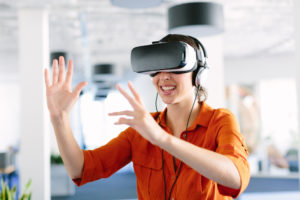 Virtual reality (VR) is a true tech wunderkind. In a few short years, VR has gone from a far-fetched, sci-fi dream to pop culture phenomenon. Virtual reality, augmented reality, and mixed reality have proven to be innovative and exciting media. Virtual reality is set to affect every industry, from changing how advertising is done to reshaping how user experiences are designed. In this article, we'll explore how VR gained so much favor, and why this could affect your business.
Virtual reality (VR) is a true tech wunderkind. In a few short years, VR has gone from a far-fetched, sci-fi dream to pop culture phenomenon. Virtual reality, augmented reality, and mixed reality have proven to be innovative and exciting media. Virtual reality is set to affect every industry, from changing how advertising is done to reshaping how user experiences are designed. In this article, we'll explore how VR gained so much favor, and why this could affect your business.
The virtual reality market continues to grow
Augmented reality (AR) applications continue to proliferate on the app stores. Microsoft continues to invest in its mixed reality applications and hardware. Social media juggernaut Facebook continues to pour an obscene amount of money into Oculus Rift, its proprietary VR device, and its social VR software. VR's rapid growth shows no signs of slowing. Some predict that the market could balloon to over US$40 billion by 2020. AR mobile apps like Pokemon Go have shown the power of well-implemented AR software. The single application was able to generate over US$1 billion in revenue in just one year. Pokemon Go doesn't exist in a vacuum. Other companies have launched VR, AR and MR apps and have been met with surprising success. Sony's VR system, PSVR, sold over 2 million units last year, well over both internal and external estimates. The HTC Vive posted similarly impressive numbers. By all accounts, it seems that VR has exceeded expectations.
Virtual reality hardware isn't pricey anymore
What's behind this voracious growth? For one thing, VR is relatively inexpensive. While you might not be able to have a state-of-the-art virtual reality experience without shelling out hundreds of dollars, there are more affordable ways to enjoy VR. All you need to do to immerse yourself in another world is a smartphone a nearly-free Google Cardboard VR headset. Anyone and everyone can participate in a cutting-edge technology. In addition, many of the VR applications available on smartphones are completely free to play. While they more closely resemble VR demos rather than full-fledged experiences, this lack of barrier to entry has allowed VR and related tech to prosper.
Virtual reality is the "ultimate empathy machine"
The enthusiasm for VR is also in part due to the unique user experience it provides. Inside virtual reality, stories become a visceral, indelible experience. Controls are far more intuitive, characters are far more relatable. VR has proven to help connect people to real-world events too. The New York Times is using VR to tell important news stories. In these experiences, the viewer can come face-to-face with the individuals within the story. As Chris Milk, CEO of VR company Within, puts it, "Virtual reality is the 'ultimate empathy machine.' These experiences are more than documentaries. They're opportunities to walk a mile in someone else's shoes."
A new kind of advertising: Promotional reality
Ikea, Sephora and North Face started to use emerging tech for promotional purposes. Their AR marketing efforts have led to some major wins for these retailers. With Ikea's app, customers can drag and drop furniture into their living space and approximate, through the use of their smartphone camera, how a new piece of Ikea furniture might look. Sephora added an AR beauty app that lets users try on makeup looks by superimposing certain lipstick shades and eyeliner looks using users' selfie poses. North Face is experimenting with VR in stores, allowing users to visit different locales with VR headsets. Surely, as VR continues to grow in popularity, more companies will produce VR, MR and AR products for PR and marketing purposes.
What's next
It's always hard to tell how tech will evolve. Surprisingly, virtual reality has been breeding ground for innovation. Prices are dropping for VR hardware and the potential market cap is growing. VR will reshape more than just technology. It will reshape how we perceive stories, how we craft user experiences, and how we connect online. It's already proven to be a medium that can attract customers, and could more greatly alter content marketing and digital PR in the years to come. As VR becomes more popular, marketing efforts for every industry will change. As with the arrival of every new medium, there will be new art, new games, new stories, and new advertisements that spring forth from it.